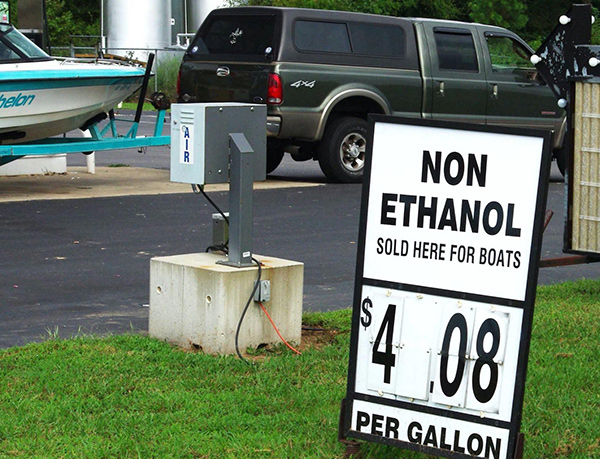By Louie Stout
 Ethanol Issues Keep Outboard Boat Mechanics Busy
Ethanol Issues Keep Outboard Boat Mechanics Busy
If your outboard engine runs and stops or not at all, Andy Peterson probably knows why.
Too much Ethanol in the fuel. Your car may run fine on it, but outboards…not so much.
“We’re seeing numerous problems because of ethanol,” said the co-owner of Starboard Choice Marine in Edwardsburg, Mich. “It’s a huge marine issue throughout the country.”
And he’s not kidding.
A “Boating Industry” readership survey of dealers and marinas shows that 92 percent of those responding to the survey had seen engine failures caused by ethanol in today’s gasoline. That was up 87 percent over a similar survey the previous year.
As one Minnesota dealer put it, “Ethanol fuels are great for our service department but BAD for our customers.”
Not a boater? You could be affected, too. Those issues are creeping into small engines, too, such as chainsaws, snow blowers, and weed eaters that run on gas.
And if a current Federal proposal gets through Washington, it’s only going to get worse. The Feds are eager to expand the amount of ethanol gasoline suppliers can blend with the fuel.
Most gasoline around here is supposed to contain no more than 10 percent ethanol. However, the Feds have approved 15 percent in some states and want more next year. Station pumps offering 15 percent are marked, but with a small sticker that many people might overlook.
Another problem, says Peterson, is that some filling stations’ gas contain more than 10 percent even though the pump may say otherwise.
“We test the fuel of every boat that comes in here,” he explained. “We’ve seen as high as 18 percent ethanol and several at 15 percent. I’d say that 60 percent of our service issues are fuel related.”
Petersons surmised the added ethanol could occur mistakenly by fuel suppliers who accidentally get the wrong blend in a tanker headed to a gas station that sells only 10 percent ethanol fuels.
The problem is compounded when a fuel sits idle over time. The ethanol in boat tank absorbs moisture from the air, especially in the tanks of infrequently used boats tied to docks during the summer.
That causes fuel separation and your outboard won’t run on gas and water.
And there’s more. Peterson says he’s seen the ethanol eat through fuel lines and diaphragms.
Peterson couldn’t stress enough the importance of boaters and small engine operators to either use ethanol free fuels or to add a fuel stabilizer to the tank.
“The fuel stable certainly helps,” he added.
Ethanol-free pumps are scant, but you can google the topic and find web sites listing where they are located in each state.
“Two that I know about around here are some of the Martin Supermarkets and Bellmart BPs,” he said.
Don’t assume that filling up the boat tank with premium fuel is a solution, he added. Peterson says few people use premium, hence that fuel lays in the underground tanks longer than “regular,” where it can absorb moisture and other debris.
In addition, he suggests boaters store their boats this fall with as little fuel as possible. When you refill next spring, fill with fresh gas and reduce the likelihood of fuel separation if your full tank sits in storage.
“We’ve been told for years you should store boats with full tanks, but ethanol has changed that,” he said.